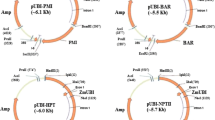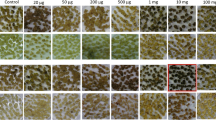Abstract
A new method for the selection of transgenic plants has been developed. It is based upon selection of transgenic plant cells expressing the xylA gene from Streptomyces rubiginosus, which encodes xylose isomerase, on medium containing xylose. The xylose isomerase selection system was tested in potato and the transformation frequency was found to be approximately ten fold higher than with kanamycin selection. The level of enzyme activity in the transgenic plants selected on xylose was 5- to 25-fold higher than the enzyme activity in control plants. Potato transformants were stable over two generations in Southern blotting analysis. This novel selection system is more efficient than the traditionally used kanamycin-based selection systems. In addition, the xylose isomerase system is independent of antibiotic or herbicide resistance genes, but depends on an enzyme that is generally recognized as safe for use in the starch industry and which is already being widely utilized in specific food processes.
Similar content being viewed by others
Author information
Authors and Affiliations
Rights and permissions
About this article
Cite this article
Haldrup, A., Petersen, S. & Okkels, F. Positive selection: a plant selection principle based on xylose isomerase, an enzyme used in the food industry. Plant Cell Reports 18, 76–81 (1998). https://doi.org/10.1007/s002990050535
Received:
Revised:
Accepted:
Published:
Issue Date:
DOI: https://doi.org/10.1007/s002990050535




